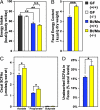Effects of the gut microbiota on host adiposity are modulated by the short-chain fatty-acid binding G protein-coupled receptor, Gpr41
- PMID: 18931303
- PMCID: PMC2569967
- DOI: 10.1073/pnas.0808567105
Effects of the gut microbiota on host adiposity are modulated by the short-chain fatty-acid binding G protein-coupled receptor, Gpr41
Abstract
The distal human intestine harbors trillions of microbes that allow us to extract calories from otherwise indigestible dietary polysaccharides. The products of polysaccharide fermentation include short-chain fatty acids that are ligands for Gpr41, a G protein-coupled receptor expressed by a subset of enteroendocrine cells in the gut epithelium. To examine the contribution of Gpr41 to energy balance, we compared Gpr41-/- and Gpr41+/+ mice that were either conventionally-raised with a complete gut microbiota or were reared germ-free and then cocolonized as young adults with two prominent members of the human distal gut microbial community: the saccharolytic bacterium, Bacteroides thetaiotaomicron and the methanogenic archaeon, Methanobrevibacter smithii. Both conventionally-raised and gnotobiotic Gpr41-/- mice colonized with the model fermentative community are significantly leaner and weigh less than their WT (+/+) littermates, despite similar levels of chow consumption. These differences are not evident when germ-free WT and germ-free Gpr41 knockout animals are compared. Functional genomic, biochemical, and physiologic studies of germ-free and cocolonized Gpr41-/- and +/+ littermates disclosed that Gpr41-deficiency is associated with reduced expression of PYY, an enteroendocrine cell-derived hormone that normally inhibits gut motility, increased intestinal transit rate, and reduced harvest of energy (short-chain fatty acids) from the diet. These results reveal that Gpr41 is a regulator of host energy balance through effects that are dependent upon the gut microbiota.
Conflict of interest statement
The authors declare no conflict of interest.
Figures




References
Publication types
MeSH terms
Substances
Grants and funding
LinkOut - more resources
Full Text Sources
Other Literature Sources
Molecular Biology Databases

